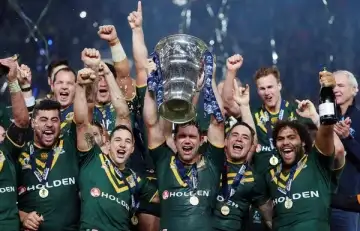World Cup team look to capitalise on success

Following an extremely successful tournament, the RLWC2013 Team are looking to capitalise on the interest generated ahead of the speculated Four Nations Tournament and beyond later this year.
Co-hosted by England and Wales, with additional games in France and Ireland, the whole World Cup saw records broken as over 400,000 fans attended the 28 games. England games also saw highviewing figures on TV with over 2m viewers watching the games against New Zealand and Australia.
In an interview with UK broadband company Plusnet, who have previously been the official broadband partner of the 2011 Gillette Four Nations, Media Executive Tom Coates stated: “The internet has been central to the marketing and promotion of Rugby League World Cup 2013. Driving fans and members of the public to our website through social media and the publication of original and engaging content has played a key role in the success of the tournament in terms of attendances and public awareness.
“We built both social media channels from scratch and have always maintained a policy of placing our supporters at the forefront of everything we do, on Facebook and Twitter in particular.
“We sought interaction, conversation and debate with supporters and responded and acted upon their comments and criticisms whenever possible. It helped to build a healthy online community where members feel valued and respected.”
Recent changes have seen the World Cup social media accounts rebranded to International RL (@IntlRl and facebook.com/intlrl) in preparation for future tournaments including the next World Cup. The hosts are yet to be decided but bids included a joint tournament between Australia and New Zealand up against a surprise bid from South Africa.
“We are currently in the process of implementing a legacy plan for the RLWC2013 Facebook and Twitter accounts. [This is] for the purpose of continuing to connect with fans of international Rugby League, and growing and nurturing the online community we have already built ahead of the next Rugby League World Cup.”
Following the success of the London Olympics over twelve months earlier, the ‘legacy’ buzzword is one that the RLWC2013 were keen to continue but Coates admitted that it was not all plain sailing.
“We focused on capitalising on the success of the Olympics, and sought to push our tournament as the successor to the 2012 event in order to transcend beyond rugby league and sports fans.
“Much of the media cynicism towards the event was generated in response to the perceived failure of the 2000 Final, and the general apathy shown towards international Rugby League by fans in this country (in terms of attendances).
Plusnet’s research into the tournament found that the number of people searching for terms such as ‘rugby league’ via Google had rocketed, reaching its highest level since Google started recording in 2004. And Coates was in no doubt in his feeling that the World Cup had been a successful oneaided by the marketing plan in place, as their social media accounts and the RLWC2013 website also saw a surge in traffic.
“Sell-out crowds communicated the message that this tournament is a success, and the reward we got from that was heightened interest in the matches that followed. We believe that people want to be a part of something that is successful, relevant and fashionable, and we tried to underpin those feelings with our own messaging.
“It shows that there is an appetite for big, well marketed events in the UK, whatever sport it is, if the product is marketed well and to the right people. Constant positive output combined with efforts to encourage supporters to speak positively about the event, share their hopes and express their opinions can have a huge impact, as it did for RLWC2013.”